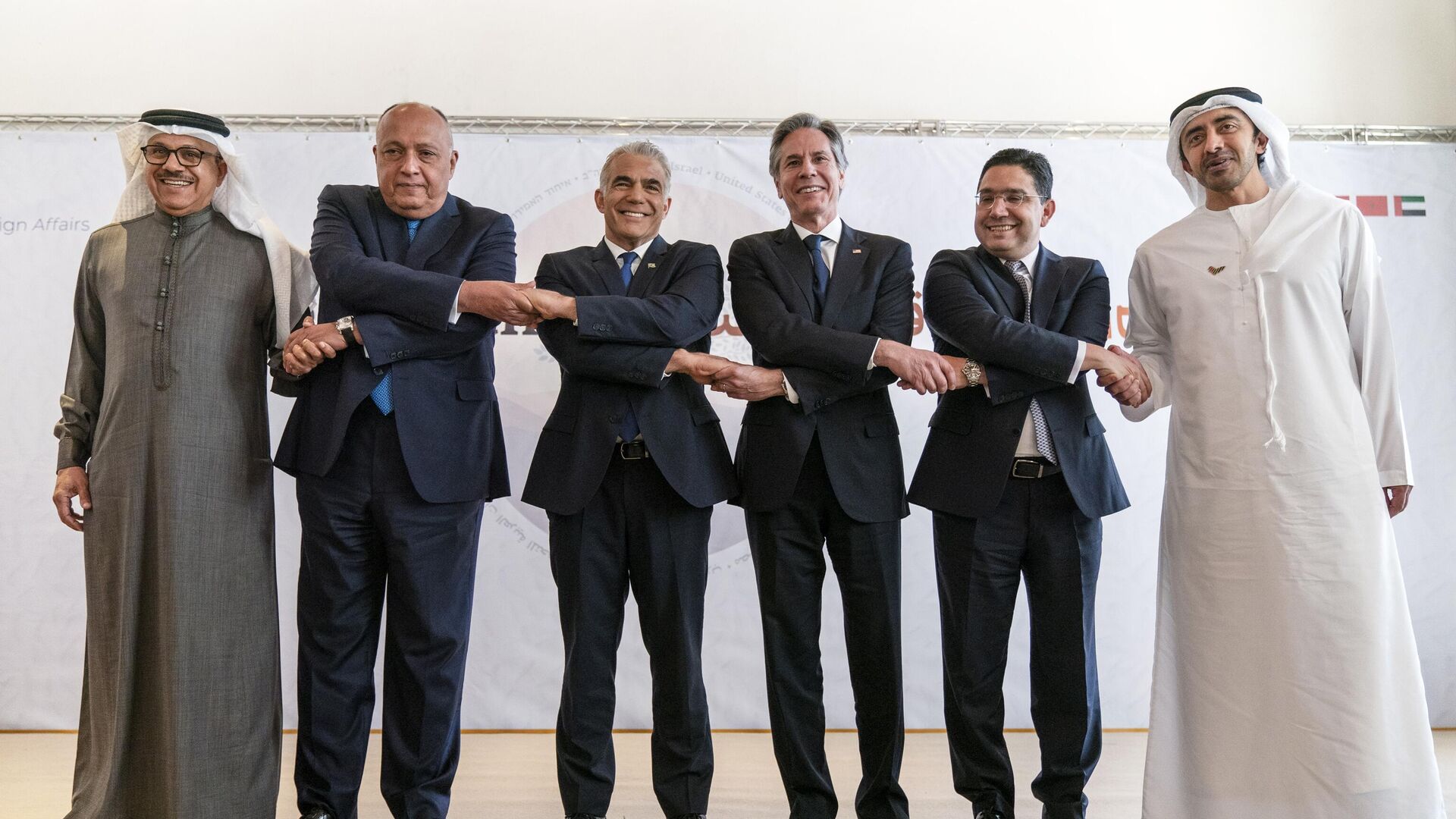Blinken Meets ‘Abraham Accords’ Partners in Negev as Israel Authorizes Five New Settlements There
19:20 GMT 28.03.2022 (Updated: 17:25 GMT 15.01.2023)

© AP Photo / Jacquelyn Martin
Subscribe
In the June 2021 deal that forged Israel’s ruling coalition government, Foreign Minister Yair Lapid agreed to a nine-month freeze on settlement construction in the Negev Desert to win the support of the Joint Arab List.
US Secretary of State Antony Blinken met on Monday with foreign ministers from four Arab states that have normalized relations with Israel - Morocco, Egypt, Bahrain and the United Arab Emirates - in Israel’s southern Negev desert.
"Just a few years ago this gathering would have been impossible to imagine. The United States has and will continue to strongly support a process that is transforming the region and beyond," Blinken said at the Negev summit.
An Israeli diplomatic official told journalists that Israel had discussed with its Arab partners “advancing a regional security architecture,” focusing on threats by “air, sea, and piracy.”
In the wake of Israel’s lightning victory in the 1967 Six-Day War, when it seized the West Bank, East Jerusalem, Gaza, Golan Heights, and the Sinai Peninsula, the Arab League members met in Khartoum to forswear the “Three Nos” regarding Israel: no recognition, no peace, no negotiation. Aside from the above-mentioned states, plus Sudan and Jordan, no Arab power has diplomatic relations with Israel.
While Egypt negotiated a peace deal with Israel in the 1970s that culminated in the 1978 Camp David Accords, the other three states did so in 2020 as part of what then-US President Donald Trump called the Abraham Accords. Sudan also normalized relations in 2020, although with a military junta in power since October, Sudan has seen Jerusalem distance itself from Khartoum on the public stage.
The Abraham Accords were also supposed to forestall Israel’s planned annexation of part of the Jordan River Valley in the West Bank, which is desired by many Zionist leaders but opposed by Palestinians, and which would violate United Nations Security Council resolutions deeming the Israeli occupation of the West Bank and its annexations of East Jerusalem and the Golan to be illegal.
A day prior, Blinken met with senior Israeli leaders before going to Ramallah to meet with Mahmoud Abbas, president of the Palestinian National Authority, a government that exercises authority over parts of the West Bank as a consequence of the 1994-5 Oslo Accords. It was envisaged that this government would become the nucleus of a future Palestinian state, but negotiations with Israel stalled long ago, and the perpetual march of Jewish settlers into the West Bank has only further complicated the situation.
"The current events in Europe have shown blatant double standards," Abbas told Blinken on Sunday. "Despite the crimes of the Israeli occupation that amounted to ethnic cleansing and racial discrimination... we find no one who is holding Israel responsible for behaving as a state above the law.”
Jordan’s King Abdullah II also visited Abbas in the West Bank but declined to go to the Negev summit. However, he did meet with Lapid earlier this month in an attempt to ensure there would be no provocations at Jerusalem’s Al-Aqsa mosque by Jewish settlers during Ramadan, which begins on Friday. Last year, violence in East Jerusalem, including the storming of Al-Aqsa by Israeli settlers and police, helped set off an 11-day war between Israel and Gaza that killed 254 Palestinians and 13 Israelis.
Also on Sunday, the Israeli cabinet approved the construction of four new Jewish settlements in the eastern Negev near the Dead Sea: one kibbutz and three villages. A fifth settlement was also approved for Bedouin Arabs who live in the region. As part of the deal to form a coalition government last June, Lapid agreed to a nine-month settlement freeze in the Negev to win the support of the Joint Arab List, or Ra’am - the only Arab party in the Knesset to ever join an Israeli government. That moratorium expired earlier this month.
However, the expansion of Israeli settlements in the Negev is strongly opposed by the roughly 300,000 Bedouins, who are often evicted from their towns and farms. Protests swept the region in January after the Jewish National Fund proposed forestry expansion onto Bedouin farms near the village of Sawa on Tu BiShevat, which functions as Israel’s Arbor Day.
"Our goal is to return the state to the Negev – Zionism 2022,” Israeli Prime Minister Naftali Bennett, a right-wing figure who supports annexation of the West Bank, said on Sunday. “This is neither ex territoria, nor is it the Wild West but a place in which the State of Israel is present – in both governance and resources.”
Blinken is set to travel to North Africa, including Algeria and Morocco, later this week.
